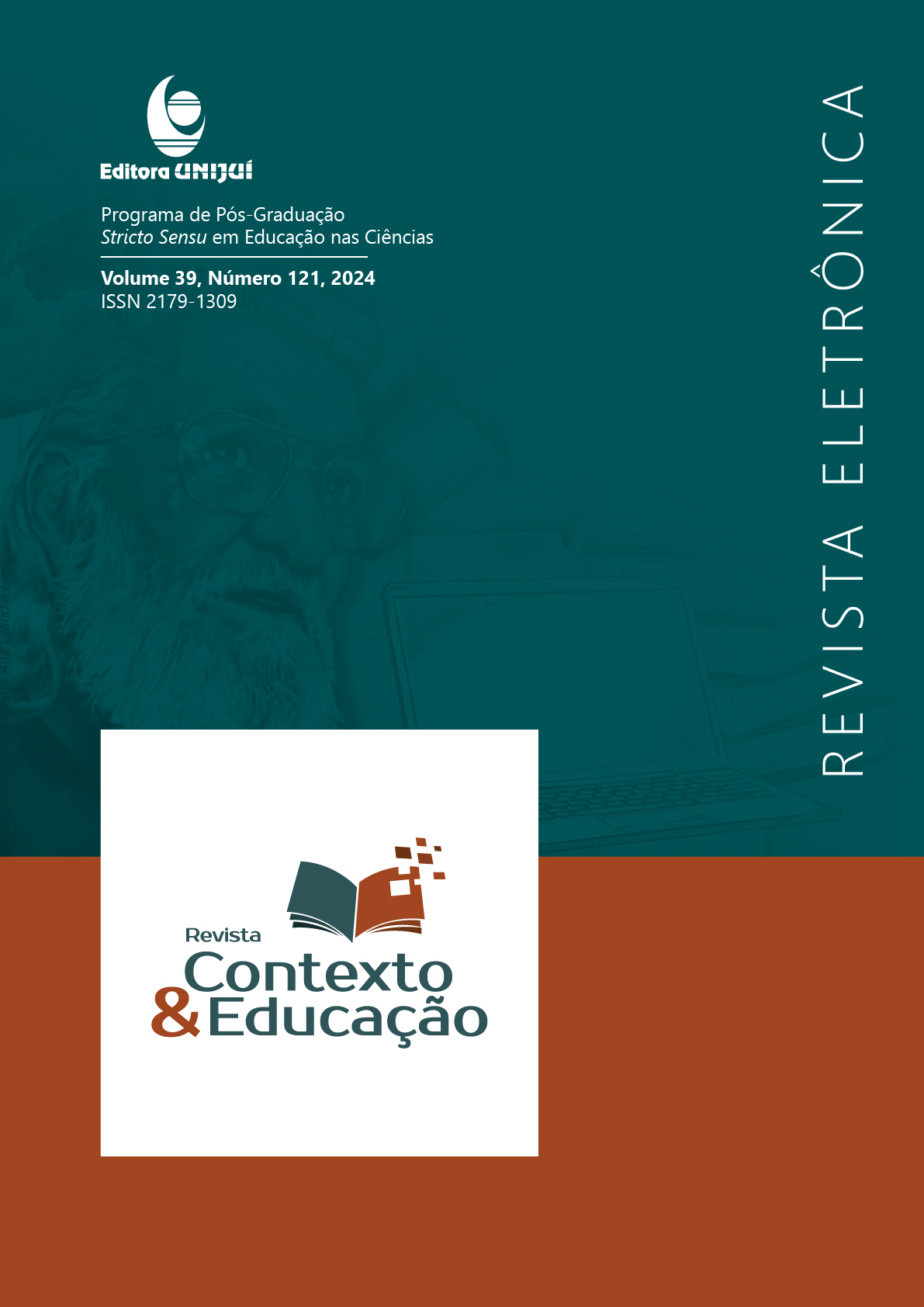Kheiron: Uma aplicação web para acompanhamento pedagógico focado em treinamentos de programação competitiva
DOI:
https://doi.org/10.21527/2179-1309.2024.121.15622Palavras-chave:
aprendizagem, programação, computação, educaçãoResumo
A programação competitiva é um esporte mental em que os competidores resolvem problemas de Ciência da Computação dentro de um tempo limitado, sem acesso a materiais externos. Ganhou popularidade nas instituições de ensino fundamental e médio com o crescimento da internet e das competições como a Olimpíada Brasileira de Informática e a Maratona Brasileira de Programação. Professores têm treinado seus alunos para participarem desses eventos, mas a falta de plataformas adequadas dificulta o sucesso no preparo dos competidores. Para suprir essa demanda, foi desenvolvida a aplicação web Kheiron para o auxílio pedagógico, aplicação que facilita o gerenciamento e acompanhamento dos estudos dos alunos por parte do docente e fornece ferramentas de análise e de repasse de conteúdo, além de permitir que o aluno seja atendido diretamente pelo docente/treinador ou por um robô (bot) dotado de Inteligência Artificial Generativa. Para o desenvolvimento deste trabalho, aplicou-se uma pesquisa exploratória, seguida de uma revisão bibliográfica.
Referências
ANDERSON, Ross. Security engineering: a guide to building dependable distributed systems. 3rd ed. [S. l.]: Wiley, 2020.
BENTO, Luciana; BELCHIOR, Gerlaine. Mídia e educação: o uso das tecnologias em sala de aula. Revista de Pesquisa Interdisciplinar, vol. 1, 2016.
BOMFOCO, Marco Antônio; AZEVEDO, Victor de Abreu. Os jogos eletrônicos e suas contribuições para a aprendizagem na visão de J. P. Gee. Renote – Novas Tecnologias na Educação, no. 3, p. 8, 2012.
CUSTÓDIO, Nathália Meloni; RODRIGUES, Alessandra. Tecnologias e formação inicial docente: O papel do professor formador na construção do pensamento crítico e da cidadania digital. Revista Contexto & Educação, vol. 38, no. 120, p. e12765, 14 Nov. 2023.
FERREIRA, Roni; BRAGA, Marco. Ensino de programação e as estratégias pedagógicas utilizadas no Brasil. Revista Contexto & Educação, vol. 38, no. 120, p. e11377, 20 Jun. 2023.
GIL, Antonio Carlos. Como elaborar projetos de pesquisa. 4a. [S. l.]: Atlas, 2002.
HALIM, Steven; HALIM, Felix. Competitive Programming 3. [S. l.]: lulu, 2013.
IMPACTA. Chat GPT x Educação: enxergando a tecnologia a favor do ensino. 2023. Disponível em: https://www.impacta.com.br/blog/chat-gpt-educacao-enxergando-a-tecnologia-a-favor-do-ensino/. Acesso em: 6 Dec. 2023. (Acesso em: 15 de out. de 2023).
JOSHI, Shailja; SAINI, Hemraj; RATHEE, Geetanjali. SALT cryptography for privacy in mobile crowdsourcing. International Journal of Information Technology, vol. 12, no. 2, p. 585–591, 14 Jun. 2020. DOI 10.1007/s41870-019-00281-2.
KAPP, Karl M. The gamification of learning and instruction: game-based methods and strategies for training and education. [S. l.]: Pfeiffer & Company, 2012.
LI, Chao; ZHOU, Hong. Enhancing the Efficiency of Massive Online Learning by Integrating Intelligent Analysis into MOOCs with an Application to Education of Sustainability. Sustainability, vol. 10, no. 2, p. 468, 9 Feb. 2018.
MACHADO, Marly Stephany Magalhães; CLEOPHAS, Maria das Graças. Estratégia metacognitiva no ensino de ciências: Fornecendo o feedback com apoio das tecnologias digitais. Revista Contexto & Educação, vol. 38, no. 120, p. e13447, 14 Nov. 2023.
MCGETTRICK, Andrew; BOYLE, Roger; IBBETT, Roland; LLOYD, John; LOVEGROVE, Gillian; MANDER, Keith. Grand Challenges in Computing: Education---A Summary. The Computer Journal, vol. 48, no. 1, p. 42–48, 1 Jan. 2005.
OBI. Caderno de Tarefas. 2007. Disponível em: https://olimpiada.ic.unicamp.br/static/extras/obi2007/provas/ProvaOBI2007_f1p1.pdf. Acesso em: 10 Dec. 2023.
OBI. Sobre a OBI. 2022. Disponível em: https://olimpiada.ic.unicamp.br/info. Acesso em: 5 Dec. 2023.
PIOVEZAN, Patricia Regina; RI, Neusa Maria Dal. Flexibilização e Intensificação do Trabalho Docente no Brasil e em Portugal. Educação & Realidade, vol. 44, no. 2, p. 9–17, 2019.
QUEIROZ, Francisco de Assis. A relação professor/aluno: importância dos vínculos afetivos ao processo de ensino aprendizagem. 2016. Disponível em: https://monografias.brasilescola.uol.com.br/educacao/relacao-professor-aluno-importancia-dos-vinculos-afetivos-ao-processo-de-ensino-aprendizagem.htm. Acesso em: 5 Dec. 2023.
RIBEIRO, Pedro; GUERREIRO, Pedro. Early introduction of competitive programming. Olympiads in Informatics, vol. 2, p. 149–162, 2008.
SILVEIRA, Antonio Claudio Jorge da; TONINI, Adriana Maria. Evasão discente em cursos de engenharia de computação e o trabalho em TIC – Tecnologia da Informação e Comunicação. Revista Contexto & Educação, vol. 38, no. 120, p. e10770, 27 Nov. 2023.
UPF. Maratona de Programação SBC. 2019. Disponível em: https://www.upf.br/maratonasbc. Acesso em: 10 Dec. 2023.
VIEGAS, Moacir Fernando. Trabalhando Todo O Tempo: Sobrecarga E Intensificação No Trabalho De Professoras Da Educação Básica. Educaçao E Pesquisa: Revista Da Faculdade De Educação Da Universidade De São Paulo, vol. 48, no. 1, 2022.
Downloads
Publicado
Como Citar
Edição
Seção
Licença
Copyright (c) 2024 Revista Contexto & Educação

Este trabalho está licenciado sob uma licença Creative Commons Attribution 4.0 International License.
Ao publicar na Revista Contexto & Educação, os autores concordam com os seguintes termos:
Os trabalhos seguem a licença Creative Commons Atribuição 4.0 Internacional (CC BY 4.0), que permite:
Compartilhar — copiar e redistribuir o material em qualquer meio ou formato;
Adaptar — remixar, transformar e criar a partir do material para qualquer fim, inclusive comercial.
Essas permissões são irrevogáveis, desde que respeitados os seguintes termos:
Atribuição — os autores devem ser devidamente creditados, com link para a licença e indicação de eventuais alterações realizadas.
Sem restrições adicionais — não podem ser aplicadas condições legais ou tecnológicas que restrinjam o uso permitido pela licença.
Avisos:
A licença não se aplica a elementos em domínio público ou cobertos por exceções legais.
A licença não garante todos os direitos necessários para usos específicos (ex.: direitos de imagem, privacidade ou morais).
A revista não se responsabiliza pelas opiniões expressas nos artigos, que são de exclusiva responsabilidade dos autores. O Editor, com o apoio do Comitê Editorial, reserva-se o direito de sugerir ou solicitar modificações quando necessário.
Somente serão aceitos artigos científicos originais, com resultados de pesquisas de interesse que não tenham sido publicados nem submetidos simultaneamente a outro periódico com o mesmo objetivo.
A menção a marcas comerciais ou produtos específicos destina-se apenas à identificação, sem qualquer vínculo promocional por parte dos autores ou da revista.
Contrato de Licença (para artigos publicados a partir de outubro/2025): Os autores mantém os direitos autorais sobre seu artigo, e concedem a Revista Contexto & Educação o direito de primeira publicação.


